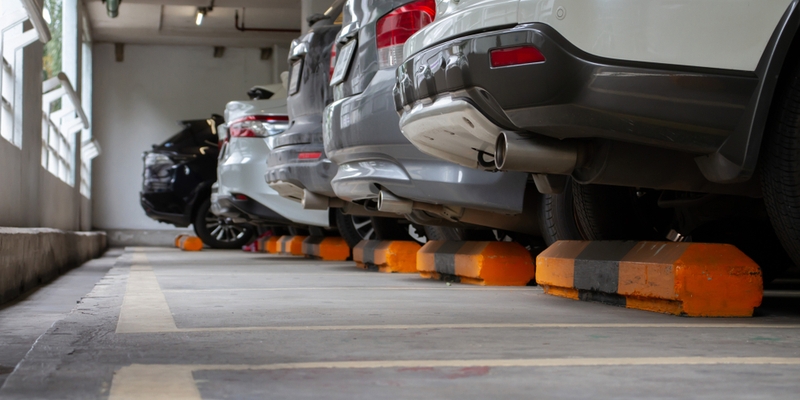
If you are not redirected within 30 seconds, please click here to continue.
Samedi: 10h – 16h HAE

If you are not redirected within 30 seconds, please click here to continue.
If you are not redirected within 30 seconds, please click here to continue.
Car accidents in parking lots: Who is at fault?

Table of Contents
This article has been updated from a previous version
Parking lot accidents are more common than you think.
With their strategically placed speed bumps and low speed limits, one might wonder how it’s possible to get into an accident in a parking lot or underground garage.
But that’s exactly what makes it susceptible to a high rate of collisions.
Pedestrians obstructing the view of a car backing up or because of the tight space, a vehicle hitting a stationary object – these are a few common examples of parking lot accidents.
Which brings us to the question: how will a parking lot collision affect your auto insurance premium?
Common questions about parking lot accidents:
- Do rules of the road apply in parking lots?
- When are you at fault in a parking lot accident?
- How do I avoid getting into a parking lot accident?
- What do I do if I get in a parking lot accident?
- What will happen to my auto insurance premium?
Do rules of the road apply in parking lots?
Whenever you get behind the wheel to operate a motor vehicle, all traffic laws apply.
The one outlier is Ontario, where parking lots are considered private property, not roads. Therefore, the traffic rules of the Highway Traffic Act do not apply to them.
That does not mean you can drive erratically in a parking lot in Ontario and not face the consequences of your actions. On the contrary, the Criminal Code still applies — so you can’t drive under the influence or drive recklessly — and some Ontario municipalities have declared the parking lots in their jurisdictions as roads. Thus, the Highway Traffic Act does apply. Otherwise, traffic laws do apply to parking lots in every other part of Canada.
Read more: At-fault accident rules: 10 common accidents and who is at fault
When are you at fault in a parking lot accident?
Sometimes, we all need a refresher on what our responsibilities are as motorists navigating our way through a maze of parked cars.
Always remember that a driver in a thoroughfare lane has the right-of-way before drivers in feeder lanes. A thoroughfare is generally a lane that exits to a street. These tend to be wider and are the main arteries of the parking lot. Feeder lanes, on the other hand, are smaller lanes that typically begin and end at the thoroughfares. Generally, failure to yield the right-of-way will result in you being found at fault.
That being said, here are some common parking lot collisions in which you may be found at fault.
- If you open the door of your car and someone else hits it, you are at fault. If you are opening your car door to exit, first make sure there is no oncoming traffic or cars nearby. If you open your door without looking and hit another vehicle, you are likely at fault.
- If you hit a legally parked car while driving, you are automatically at fault. There are no ifs, ands, or buts about it. Regardless of the situation, if you hit a legally parked vehicle, you are at fault.
- You must obey all signs in a parking lot. The signs are there for a reason. If you get in an accident because you disobeyed a traffic sign, then yes, you are at fault.
- If you are pulling out of a parking space, yield to oncoming vehicles. Before pulling out of a parking spot, you must make sure there is no traffic or oncoming cars. If you back out without checking behind you and you collide into a vehicle, you will likely be found at fault.
Keep reading: What is right-of-way in Canada?
How do I avoid getting into a parking lot accident?
A little common sense goes a long way. Here are five tips to help avoid getting in an accident the next time you need to park in a public lot:
- Pay attention. You shouldn’t be using your mobile phone while driving and that includes while in parking lots. Also, keep an eye out for pedestrians.
- Limit blind spots. Park your vehicle facing outward. That way you do not have to reverse to get out of a parking spot. The more you can see, the less chance you have of hitting another car or person.
- Park farther away. Instead of trying to get a spot that’s close to the entrance of a department store or building, choose a place that’s farther away. Avoiding high-traffic areas helps reduce the chances of getting into a fender-bender.
- Slow down. It isn’t the Indy 500; it’s a parking lot full of other vehicles and pedestrians, including children. Stay alert and drive slowly even if the lot appears to be clear of traffic.
- Be mature. There is no benefit to getting into a kerfuffle with another driver over a parking spot. Take the high road and be courteous by letting the other motorist have the spot. You’ll always find another.
What do I do if I get in a parking lot accident?
A car accident in a parking lot or garage is the same as an auto collision on a main road because these spaces have right-of-way rules too. Parking lot accidents are treated the same way as accidents on the road. If you intend on filing a claim, gather as many details as possible. This includes taking photos, asking any passersby to be a witness if they saw the collision, and exchange your insurance information with the other vehicle’s driver. Most importantly, if anyone is hurt, immediately call 9-1-1.
Related: How to file a car insurance claim after a collision
Like in any vehicle collision, your insurer will consider all aspects of the accident, including whether or not you are at fault for it. If you are, it can impact your car insurance rate.
Related: How a car accident affects your insurance premium
Protect yourself with the right auto insurance policy
A car accident can happen anywhere, at any time and to anyone. Beyond driving safely, courteously, and obeying all traffic laws, your best protection is an auto insurance policy that caters to your unique needs.
Whether you have been in a collision or not, take a few minutes to get the best car insurance quote by comparing your existing policy to quotes in real-time from more than 30 insurance companies.
Don't waste time calling around for auto insurance
Use RATESDOTCA to shop around, and compare multiple quotes at the same time.
Latest Articles
Get money-saving tips in your inbox.
Stay on top of personal finance tips from our money experts!










